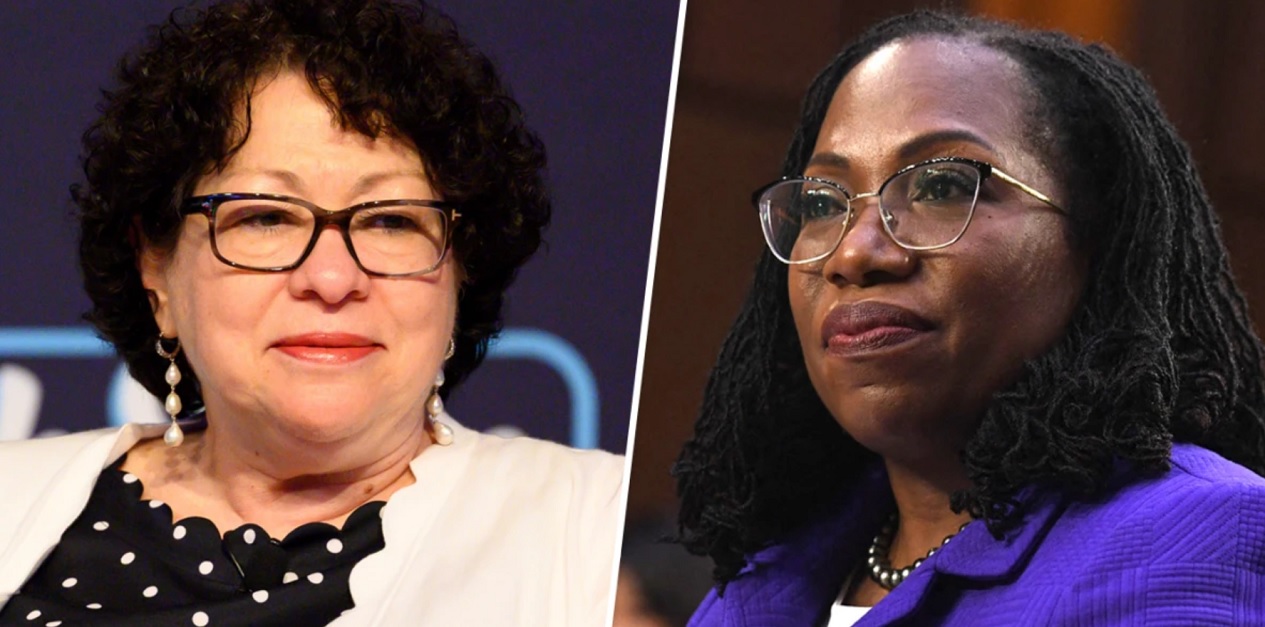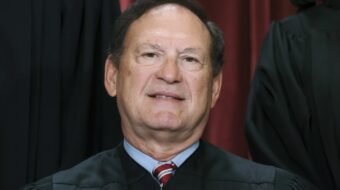
COURT UPDATE AT PRESS TIME: The Supreme Court rulings essentially eliminating the progress made over the past century in America are coming so fast and furious that it is difficult to keep up with them.
Since the story below was completed early this morning the Court ruled in favor of an evangelical Christian web designer from Colorado who refuses to work on same-sex weddings. The ruling says that as a “creative professional,” the designer has a “free speech right” not to espouse anything with which she does not agree. This could open the floodgates to businesses of all types refusing to serve LGBTQ people or even any people with whom it has religious disagreements.
Minutes later, the Court put an end to President Biden’s student loan forgiveness program, a major blow to President Biden and millions of students. It kills his plan to extend to some 43 million people relief of up to $20,000 in debt.
WASHINGTON—Overturning 45 years of law, disregarding continued endemic racism in the U.S., and continuing full steam ahead with their drive to undo all the progress made for more than a century, the six Republican-named majority of U.S. Supreme Court justices killed affirmative action in higher education admissions, drawing widespread outrage.
The vote was 6-3 against affirmative action in public universities, in a case involving the University of North Carolina. It was 6-2 in the parallel case for private universities, involving Harvard. Justice Ketanji Brown Jackson, a Harvard alumna and board member, recused herself because of her close connection to Harvard.
Chief Justice John Roberts’s ruling killing affirmative action in college admissions was the latest in a string of activist decisions turning back the clock of progress in America by the right-wingers, stretching back to awarding the presidency to George W. Bush over Al Gore, by stopping Florida’s vote count in 2000.
But the rulings have come thick and fast and momentous starting in 2010: Overturning worker rights several times, revoking the constitutional right to abortion after 49 years, trashing the strongest section of the 1965 Voting Rights Act, opening the gates to a tsunami of hidden campaign contributions by the rich and corporations, legalizing carnage by outlawing gun controls and backing the corporate class over everybody else, to name only a few of the dangerous rulings made by the right-wing justices.
The affirmative action ban has ramifications far beyond the nation’s campuses. A steaming Justice Sonia Sotomayor, leading the three Democratic-named justices who opposed the Republican-named majority, read portions of her dissent aloud, an unusual move.
“The court cements a superficial rule of colorblindness as a constitutional principle in an endemically segregated society where race has always mattered and continues to matter. The court subverts the constitutional guarantee of equal protection by further entrenching racial inequality in education, the very foundation of our democratic government and pluralistic society,” Sotomayor declared.
“Because the court’s opinion is not grounded in law or fact and contravenes the vision of equality embodied in the 14th Amendment, I dissent.”
The rulings—including the affirmative action ban—also shed light on the fact that the premier branch of the federal government, Congress, hasn’t done its job, in legislating to solve this problem and others.
It’s been hamstrung by right-wing filibusters, pro-fascist lawmakers from gerrymandered districts—elected extremists bent on destruction, killing “enemies” and blindly following Donald Trump–and overriding dependence on special interests, whom legislators cater to for campaign dollars needed to keep their seats. Ideologues of segregation, and worse, now rule one major party, the Republicans.
Congress must step up
“Congress has not lived up to its responsibilities,” one analyst said. “If it had codified affirmative action” rather than waiting for the court to kill or keep it, “we wouldn’t be having this discussion. If it had codified the Voting Rights Act, we wouldn’t be having this discussion” about voter repression. “If it had passed universal health care, people wouldn’t be dying” including dying women who have been denied abortions.
“It’s long past time Congress fulfills its responsibility in reining in a dangerous court that routinely issues unacceptable, unpopular, and damaging opinions in the name of a partisan agenda. Our fight for justice will continue. But this decision is a stain on our nation’s principles that will not be so easily reversed,” warned Teachers (AFT) President Weingarten.
“This decision is nothing more than politically charged, regressive policymaking from the bench,” said Weingarten, a New York civics teacher with a law degree whose union now includes university professors.
“The equal protection clause of the 14th Amendment enshrines a guarantee of racial equality. The court long ago concluded that this guarantee can be enforced through race-conscious means in a society that is not, and has never been, colorblind,” Sotomayor continued. In her dissent. The court majority “rolls back decades of precedent and momentous progress. It holds race can no longer be used in a limited way…to achieve critical benefits.”
Justices Ketanji Brown Jackson and Elena Kagan joined Sotomayor on the North Carolina case, though Justice Jackson absented herself from the Harvard case. But she took a shot at the six Republicans in her written North Carolina dissent, quoting the infamous French queen Marie Antoinette. The majority showed “let-them-eat-cake obliviousness” in “‘colorblindness for all’ by legal fiat,” Justice Jackson wrote.
The justices also do not outlaw other forms of affirmative action, as Rep. Alexandria Ocasio-Cortez, D-N.Y., caustically tweeted. Her district is one of the poorest in the U.S. and one of those with the largest shares of people of color.
“If SCOTUS was serious about their ludicrous ‘colorblindness’ claims, they would have abolished legacy admissions, aka affirmative action for the privileged. 70% of Harvard’s legacy applicants are white. SCOTUS didn’t touch that–which would have impacted them and their patrons,” Ocasio-Cortez wrote.
The justices “know well” banning affirmative action on the basis of race “plays well with their base” their Republican constituency of white nationalists, one analyst said. That’s even though affirmative action also benefits voters and students in poor rural states, or is valuable if the student is the first in the family to even seek a college education, or if the student comes from a high-poverty neighborhood.
“The right wing doesn’t like to talk about that,” the analyst added.
As might be expected, progressive groups denounced the ruling, although a coalition of 11 of them saw some glimmers of light during a Zoom press briefing. The group, which included the NAACP, the Urban League, UnidosUS, the National Council of Negro Women (NCNW), and the Rev. Al Sharpton of the National Action Network, pointed out the ruling affects only colleges and universities and their admissions processes, not everything else on the nation’s campuses.
They also pledged to work in a grand coalition to overcome its impact.
“There has been a lot of outrage, but few of us were surprised, given the nature and politics of the court,” Sharpton said. “Even before the” text of “the ruling came out, Donald Trump reminded people he put three of those six justices on the court, so consider the political intent.”
Must find other ways
Coalition members said, that first of all, the colleges and universities should find other ways to admit and aid more students of color, so that California’s experience when it outlawed affirmative action in its public colleges isn’t repeated. Proportions of Black and brown students collapsed and, 25 years later, still haven’t fully recovered.
The group also pointed out the decision does not affect private sector businesses, which, realizing the nation will be majority-minority within 20 years, must move towards inclusiveness, diversity, and equity, regardless of what the justices decide. Most Americans, 63%, agree with affirmative action and with achieving those goals, NAACP President Derek Johnson noted.
In her own statement, Becky Pringle, a Philadelphia science teacher and president of the nation’s largest union, the three-million-member National Education Association, sounded the same themes.
“For too long, color-coded barriers have been used to prevent Black, brown, and indigenous people from accessing the opportunities we all deserve and seeking to achieve our dreams. With this decision, the Supreme Court has reinforced those barriers.
“Racism and discrimination are not just artifacts of American history but continue to persist in our society…Affirmative action and programs like it expand opportunities to those historically denied a fair shot. When we ensure the many talents and experiences of students of color aren’t overlooked in admissions processes biased against them, we create schools, a country and a future that includes us all.
“NEA remains committed to that work” and demands schools, colleges, and universities “redouble their efforts to ensure our educational institutions support all students equally and equitably.”
“We are stronger when our country, communities, schools, and future includes and reflects all of us. Today’s decisions by an out-of-touch and hyper-conservative Supreme Court are yet more evidence that the court is not working for all of us.
Former Republican Oval Office occupant Donald Trump, carrying out an open pledge to the radical right, named three of the six Republican justices who killed affirmative action: Neil Gorsuch, Brett Kavanaugh, and Amy Coney Barrett.
Then Senate Majority Leader Mitch McConnell, R-Ky., hustled Barrett onto the bench just before the 2020 presidential election. And McConnell held the late Justice Antonin Scalia’s seat open for more than a year until Trump took office and nominated Gorsuch.
That prompted one more solution to the tilt of the court, from NCNW President Melanie Campbell.
“Elections matter. We’ll fight this at the ballot box. It does matter who picks who gets on the court,” she declared.
We hope you appreciated this article. At People’s World, we believe news and information should be free and accessible to all, but we need your help. Our journalism is free of corporate influence and paywalls because we are totally reader-supported. Only you, our readers and supporters, make this possible. If you enjoy reading People’s World and the stories we bring you, please support our work by donating or becoming a monthly sustainer today. Thank you!













Comments